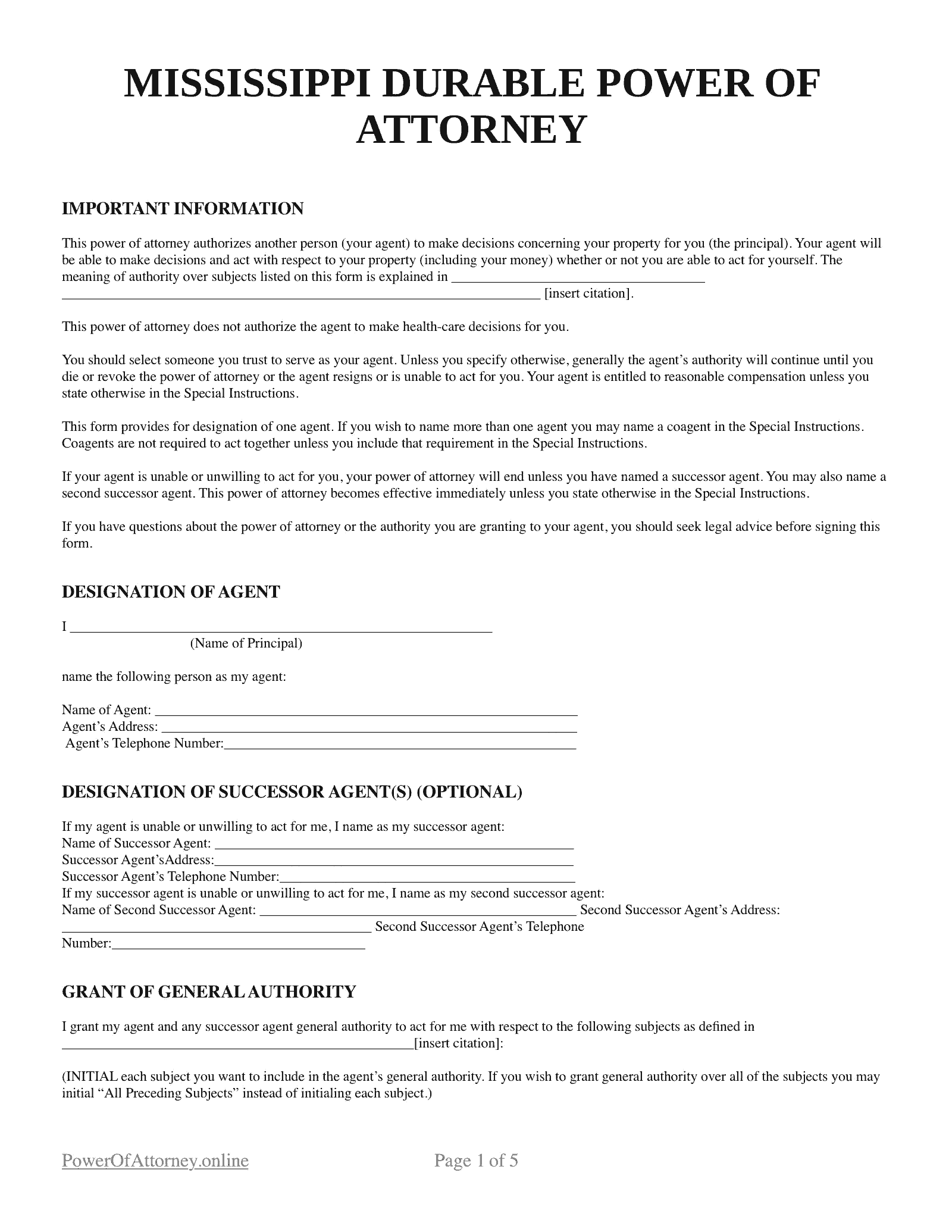Free Mississippi Durable Power of Attorney Forms
A Durable Power of Attorney (DPOA) is a legal form where a person, the “principal,” grants permission to another, referred to as the “agent” or “attorney-in-fact,” to act on their behalf.
While a healthcare power of attorney is centered on medical choices, a DPOA primarily deals with financial or personal issues.
Different from a basic power of attorney, a DPOA continues to be in force even if the principal becomes incompetent.

Mississippi Durable Power of Attorney Laws
Several Mississippi statutes describe the Durable Power of Attorney and provide guidance on its legal creation and use.
- Definition of Durable Power of Attorney: As per Mississippi law, a DPOA is a “power of attorney by which a principal designates an agent as their attorney in fact in writing. The text must contain the following words or similar: “This power of attorney shall not be affected by subsequent disability or incapacity of the principal, or lapse of time” (§ 87-3-105).
Signing Requirements in Mississippi
To activate a Durable Power of Attorney in Mississippi, adherence to the state's signing criteria is essential.
Meeting these standards ensures your DPOA gains legal standing.
- Signing Requirements: While there isn't a particular law stating a required signing method, it's highly advised for both the principal and agent to sign with a notary public present to prevent potential issues down the road (§ 87-3-105).
How To Write a Mississippi Durable POA
Establishing a Durable Power of Attorney in Mississippi that's legally sound is vital to guarantee that a dependable person can act on your behalf.
Follow this comprehensive guide to craft a document reflecting your desires and safeguarding your rights.
1. Choose your agent
Pick someone you have complete faith in as your agent. This could be a close family member, a dear friend, or a reliable advisor.
It's crucial that your choice possesses sound financial decision-making skills.
Consider appointing a secondary agent in case your first choice isn't available or willing to act when required.
2. Talk about their roles
Before committing anything to paper, have a thorough discussion with the individual you're considering as your agent. Delve into the powers you're contemplating giving them, spanning from handling daily financial tasks to crucial banking decisions.
They need to be fully aligned with your wishes and the extent of their authority.
3. Address any payment
Taking on the role of an agent might require significant commitment. Decide if you'll reward them for their effort. This could be a fixed fee, a pay-per-hour model, or a way to repay any out-of-pocket expenses they might have.
Openly discussing this upfront can help sidestep future disagreements or confusion.
4. Download a Mississippi Durable POA Form
A pre-formatted printable DPOA form can assist in eliminating mistakes and ensuring legal requirements are met.
With our form at hand, you can tailor your document to highlight your financial needs while adhering to state regulations.
5. Complete the form
Once you have the template, populate it with key details your agent must know, like:
- The DPOA's start date
- Their financial duties
- Their compensation structure
- The DPOA's validity even during your incapacity
After incorporating these, you're free to add any additional directives.
6. Sign the Durable Power of Attorney
After capturing all the requisite details, you'll need to sign it in front of the necessary witnesses.
Remember, in Mississippi, signing a Durable Power of Attorney in the company of a notary public is not mandatory for legal recognition, but highly advisable. If you're physically incapable of signing, someone of legal age can do so on your behalf.
This serves as evidence of your intentional and free-willed choice to assign the powers detailed in the document.